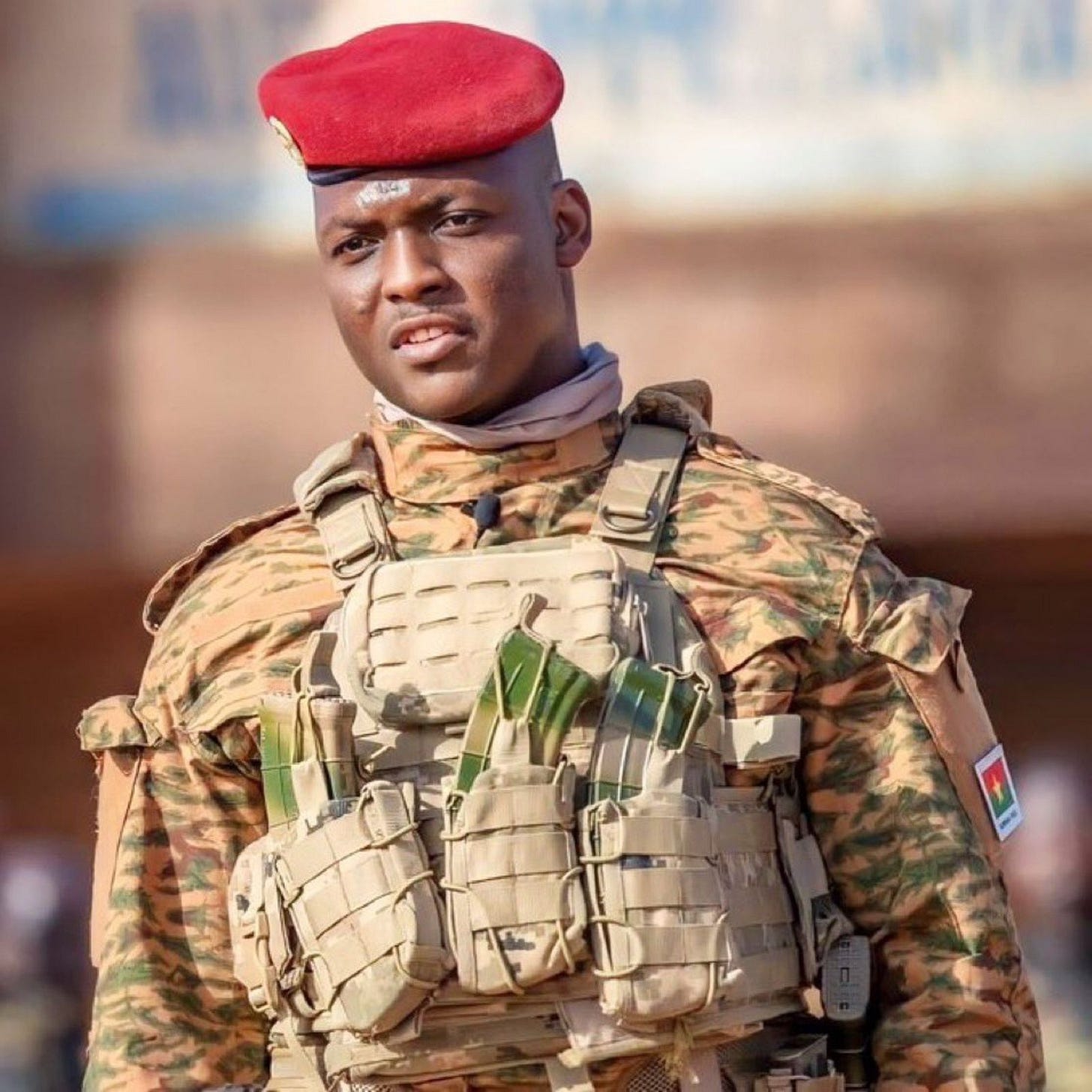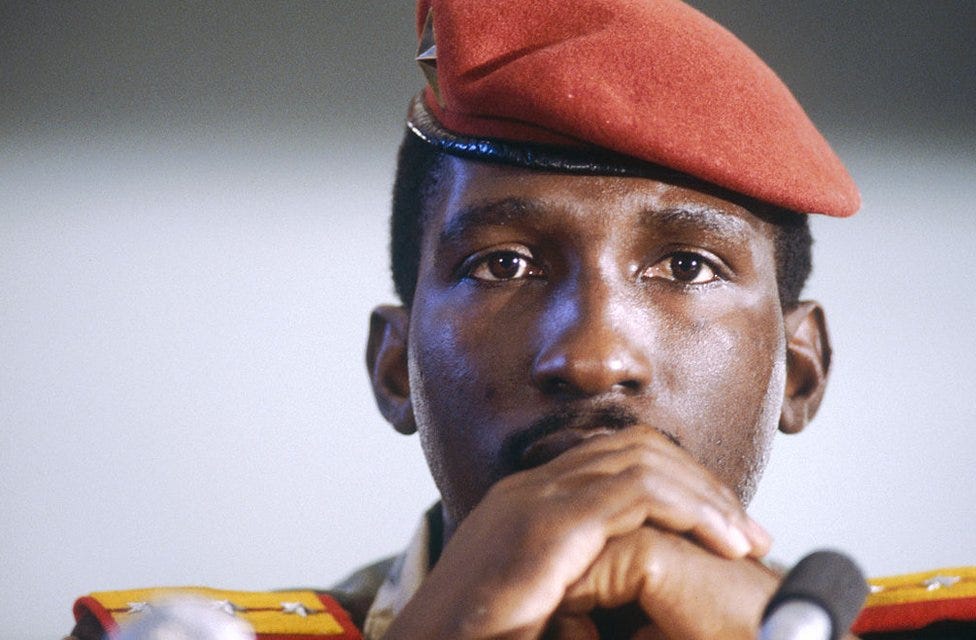Anti-Imperialists Really Need to Start Paying Attention to Ibrahim Traoré
Traoré represents one of the most promising ruptures in our imperialist world order, yet his movement receives a fraction of the attention given to the "resistance" by leaders like Putin.
In the heart of West Africa, a resistance movement has taken form—not through guerrilla warfare, but through governance. President Ibrahim Traoré of Burkina Faso stands as perhaps the most targeted African leader today, facing an unprecedented 15 assassination attempts in just two years. This staggering figure raises a profound question: Why does this particular leader inspire such determined opposition?
The answer lies not in tyranny but in conviction. Traoré has committed what the imperial powers consider the ultimate transgression—pursuing genuine sovereignty. His crime? Refusing to be controlled by Western imperialism.
The Revolution That Threatens Imperial Order
Western powers, particularly Washington and Paris, have orchestrated a relentless campaign to remove Traoré from office. This is not mere speculation but a pattern consistent with historical Western intervention against leaders who challenge neocolonial arrangements. What makes Traoré different from other military leaders in the Sahel—those in Gabon, Chad, Mali, and Niger—is his revolutionary vision that extends beyond national borders.
Traoré is not merely a head of state; he represents an ideological challenge to Western hegemony. At the Russia-Africa Summit, his fiery oratory ignited pan-African consciousness across the continent. His declaration that "the Sahel isn't just shifting, it's rising" serves as a philosophical foundation for a movement that threatens centuries of Western exploitation.
“It is very easy to judge if a leader is corrupt. If Traoré were truly corrupt and enriching himself, we would see no protest from the West about his leadership”
Manufactured Threats and Media Warfare
The Western powers have deployed their most effective weapon against African sovereignty: media manipulation. Major Western outlets have engaged in systematic character assassination, painting Traoré as corrupt, ethnically biased, and authoritarian. The U.S. commander of AFRICOM shamelessly claimed that Traoré was using Burkina Faso's gold for personal protection—a transparent attempt to delegitimize resource sovereignty.
This is the same tired tactic, employed repeatedly whenever indigenous leaders attempt to direct their countries' resources toward the impoverished populations who have historically been exploited by Western powers. We witnessed this pattern with Hugo Chávez in Venezuela—despite being democratically elected and implementing policies that improved conditions for the poorest citizens, Western media relentlessly portrayed him as corrupt and dictatorial.
These fabrications follow a well-established imperial playbook: accuse resource-nationalizing leaders of corruption while obscuring the systematic plunder carried out through "legal" Western corporate extraction.
It is very easy to judge if a leader is corrupt. If Traoré were truly corrupt and enriching himself, we would see no protest from the West about his leadership—indeed, being a corrupt, sexually depraved kleptocrat renders you part of the imperial club, practically guaranteeing diplomatic protection and glowing media profiles regardless of human rights violations. The evidence is overwhelming: Al-Golani in Syria rebranded from terrorist to "freedom fighter" in Western media despite his atrocities; Zelensky in Ukraine praised as a democratic icon while banning opposition parties; MBS in Saudi Arabia welcomed in Western capitals despite dismembering journalists; and Bolsonaro in Brazil receiving Wall Street backing while accelerating Amazon destruction.
The telltale signs of corruption would be unmistakable: luxury mansions in foreign capitals, private jets shuttling between international playgrounds, and extravagant shopping sprees while his countrymen starve. Instead, Traoré maintains a modest lifestyle, eschewing personal comfort to remain in Burkina Faso facing challenges directly alongside his people—precisely the behavior that makes him dangerous to Western interests and marks him for elimination.
Western media further attempted to inflame ethnic tensions with baseless claims that Traoré targeted the Fulani ethnic group—allegations that no journalist within Burkina Faso could substantiate despite extensive investigation. These manufactured narratives aim to divide the Burkinabè population along ethnic lines, a classic colonial strategy of divide and rule that has been deployed systematically across the Global South.
This playbook has been implemented with devastating efficiency between Russians and Ukrainians (transforming centuries of shared cultural heritage into seemingly "ancient" hatred), Uyghurs and Han Chinese (where legitimate cultural autonomy concerns were weaponized into separatist extremism), Sunnis and Shias (whose historical theological differences were magnified into sectarian violence after the Iraq invasion), Malays and Chinese (where post-colonial economic disparities were reframed as inherent ethnic incompatibility), Blacks and Whites (through centuries of scientific racism and institutional discrimination), Christians and Muslims (portrayed as fundamentally irreconcilable despite millennia of coexistence), Pakistanis and Indians (whose partition was engineered by retreating British colonizers), and Panamanians and Colombians (whose border disputes were intensified during canal negotiations).
The manufactured nature of these conflicts becomes evident when examining pre-colonial histories, where many of these groups coexisted through pragmatic power-sharing arrangements until Western imperial powers transformed cultural differences into existential threats.
“When Global South countries continue trading vital resources in dollars, they are quite literally funding the very imperial machinery deployed against their own sovereignty.”
The Neocolonial Network Exposed
What emerges from Traoré's struggle is the exposure of neocolonialism's interconnected system. A recent coup attempt reveals how external Western powers coordinate with internal actors, including military officials with colonial sympathies. The network extends beyond direct Western involvement to include neighboring states like Ivory Coast, which reportedly harbors conspirators and serves as a staging ground for destabilization efforts.
This regional dimension reveals the sophisticated nature of modern imperialism, which operates through proxy states rather than direct military intervention. Former colonial powers maintain influence through economic pressure, military training programs, and corrupt political networks that preserve exploitative arrangements while maintaining a veneer of African self-governance.
This neocolonial architecture is fundamentally underwritten by the dollar hegemony system—the exorbitant privilege acquired through the US dollar's reserve currency status enables Washington to finance endless imperial operations across the Global South without facing domestic fiscal constraints. The mechanics are ruthlessly efficient: the Federal Reserve creates currency by fiat, which then flows through military aid packages, NGO networks, media networks, and intelligence operations to subvert resource-nationalizing governments like Burkina Faso's while simultaneously indebting target nations through IMF and World Bank conditionalities that mandate privatization of national resources.
This monetary imperialism allows Western powers to maintain control of African resources without the political liabilities of direct colonialism, creating a financial stranglehold that makes formal occupation unnecessary while extracting the continent's wealth just as effectively as the colonial regimes of previous centuries.
That is why I keep repeating: the most tragic irony of modern imperialism is how the victims themselves finance their own subjugation. When Global South nations continue accumulating dollar reserves, trading vital resources in dollars, and submitting to dollar-denominated debt structures, they are quite literally funding the very imperial machinery deployed against their own sovereignty. The path to genuine independence cannot be achieved through political declarations alone, but requires dismantling this financial architecture that recycles Africa's wealth into weapons aimed at African liberation movements.
Until countries break free from this monetary colonialism through alternative currency arrangements and South-South trading systems, they will remain trapped in the self-defeating cycle of bankrolling the very empire that conspires to overthrow their legitimate governments and plunder their national patrimony.
“When examining the historical record, one pattern emerges with absolute clarity: any nation that successfully protects its resources from foreign exploitation is inevitably labeled ‘authoritarian’”
The Sovereign Response
Traoré's security reforms represent a necessary response to this multifaceted threat. His "lockdown doctrine" isn't paranoia but strategic adaptation to survive against forces that eliminated his revolutionary predecessor, Thomas Sankara. By restructuring the presidential guard, implementing encrypted communications systems, revitalizing internal intelligence, and mobilizing the Volunteer Defense Force (VDP), Traoré is creating systems resistant to imperial manipulation.
Critics who condemn these measures as authoritarian—just as China was condemned for being authoritarian in not allowing imperial platforms like Meta and Google to colonize its digital ecosystem and harvest its population's data—conveniently ignore the existential threats facing anti-imperial leaders. These armchair critics deploy selective outrage from comfortable Western capitals, applying abstract democratic ideals without acknowledging the concrete realities of nations fighting for their survival against sophisticated destabilization campaigns.
The same Western voices that sanctimoniously demand "democratic norms" have remained conspicuously silent about the assassination attempts, economic strangulation, and covert operations that make normal governance impossible. This intellectual dishonesty reveals their true concern is not democracy but rather ensuring continued Western access to strategic resources.
When examining the historical record, one pattern emerges with absolute clarity: any nation that successfully protects its resources from foreign exploitation is inevitably labeled "authoritarian," while compliant kleptocracies that surrender their wealth to Western corporations are celebrated as "emerging democracies" regardless of their actual governance practices or human rights records.
The Stakes of the Struggle
If Traoré falls, the consequences extend far beyond Burkina Faso's borders. As he himself notes, "Burkina Faso is not a democracy; it is a revolution." This revolution challenges the fundamental assumption that African nations must surrender economic sovereignty to receive Western approval.
The assassination of Thomas Sankara—Burkina Faso's revolutionary leader of the 1980s—created a decades-long vacuum in pan-African leadership. Traoré represents the revival of that revolutionary tradition, demonstrating that Africa can produce leaders committed to genuine independence rather than managed subservience.
“Traoré represents one of the most promising ruptures in our imperialist world order, yet his movement receives a fraction of the attention given to the "resistance" by capitalist non-Western leaders such as Vladimir Putin.”
The Imperative of Vigilance
The international community, particularly those committed to an anti-imperialist world order, must recognize what Traoré represents—not merely one leader's struggle, but a test case for whether genuine sovereignty remains possible in the Global South. The continued targeting of Traoré by Western powers exposes the hollow nature of liberal democratic rhetoric when confronted with challenges to economic domination.
The conspicuous silence surrounding Traoré's battle in Western "anti-imperialist" circles reveals the intellectual and moral bankruptcy of much of today's independent media ecosystem. While performatively denouncing historical colonialism, many anti-imperialists remain oblivious to or complicit in contemporary imperialism's most significant challenges. Traoré represents one of the most promising ruptures in our imperialist world order, yet his movement receives a fraction of the attention given to the "resistance" by capitalist non-Western leaders such as Vladimir Putin. This misplaced focus demonstrates how thoroughly Western narratives shape even supposedly radical discourse, directing attention toward geopolitical rivalries between competing super powers rather than genuine anti-systemic movements.
For Africans both on the continent and in the diaspora, Traoré's struggle demands vigilance against information warfare designed to fragment solidarity. The revolution in Burkina Faso represents more than one nation's path; it illuminates the contours of imperial power and demonstrates that resistance, while dangerous, remains possible.
In a world where imperial powers demand compliance, Traoré's continued defiance represents not just resistance but an alternative vision—one where African resources serve African development and where sovereignty is not merely proclaimed but practiced, regardless of Western disapproval.
- Karim
* To increase the visibility of BettBeat Media, your restack of this article would be greatly appreciated.
Your support today helps us maintain our founding principle: quality analysis available to everyone, regardless of financial means. Honor the path the early supporters have blazed by becoming a paid subscriber—together, we can build a sustainable model that respects both our work and our community's diverse economic realities.






Thank you Karim for an illuminating article. It is apropos to remind, amongst other things, that the western media did not start subverting the truth on October 7 but have been doing so whenever a non-western country threatens world domination.
Bravo. This is journalism and commentary befitting a Substackian award for excellence.